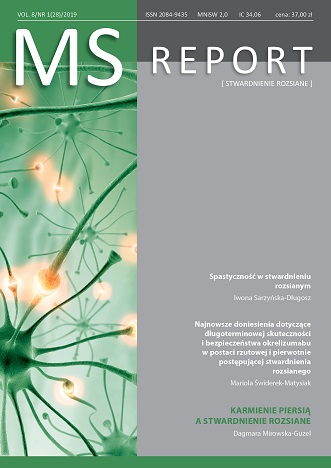Recent reports on the long-term efficacy and safety of ocrelizumab in the relapsing and primary progressive multiple sclerosis Review article
Main Article Content
Abstract
Ocrelizumab, a recombinant humanized monoclonal antibody against CD20 antigen on B lymphocytes, is the first therapeutic option for both patients with relapsing and primary progressive forms of multiple sclerosis. The efficacy and safety of the use of ocrelizumab in relapsing multiple sclerosis was determined based on two parallel, multicentre phase III studies with the active comparator interferon β-1a. The efficacy and safety of ocrelizumab in the form of primary progressive multiple sclerosis was determined based on the results of the Phase III placebo-controlled study. Patients were then observed in the extended phase of the open-label OLE study. In the three-year follow-up period, the high efficacy of ocrelizumab therapy has been demonstrated, especially in patients who have been taking ocrelizumab since the beginning of the study. In the group of patients switching from interferon β-1a to ocrelizumab, a significant improvement in the disease activity was observed in the first year of the OLE phase and this effect was sustained until the end of the observation. In primary progressive multiple sclerosis, the suppression of disease progression seen in the phase of the placebo-controlled study persisted until the end of OLE phase. Ocrelizumab also has a favorable safety profile in long-term observation.
Article Details
Copyright © by Medical Education. All rights reserved.
References
2. Mulero P., Midaglia L., Montalban X.: Ocrelizumab: a new milestone in multiple sclerosis therapy. Ther. Adv. Neurol. Disord. 2018 May 10.
3. Wekerle H.: B cells in multiple sclerosis. Autoimmunity 2017; 50(1): 57-60.
4. Hauser S., Bar-Or A., Comi G. et al.: Ocrelizumab versus Interferon Beta-1a in Relapsing Multiple Sclerosis. N. Engl. J. Med. 2017; 376: 221-234.
5. Hauser S., Brochet B., Montalban X. et al.: Long-Term Reduction of Relapse Rate and Confirmed Disability Progression After 5 Years of Ocrelizumab Treatment in Patients With Relapsing Multiple Sclerosis. ECTRIMS 2018. Poster number P590.
6. Arnold D., Kappos L., Hauser S. et al.: Long-term Reduction in Brain MRI Disease Activity and Atrophy After 5 Years of Ocrelizumab Treatment in Patients with Relapsing Multiple Sclerosis. ECTRIMS 2018. Poster number P558.
7. Wolinsky J., Brochet B., Montalban X. et al.: Sustained Reduction in Confirmed Disability Progression in Patients With Primary Progressive Multiple Sclerosis Treated With Ocrelizumab in the Open-label Extension Period of the Phase III ORATORIO Trial. ECTRIMS 2018.
8. Wolinsky J., Montalban X., Hauser S. al.: Evaluation of no evidence of progression or active disease (NEPAD) in patients with primary progressive multiple sclerosis in the ORATORIO trial. Ann. Neurol. 2018; 84(4): 527-536.
9. Hauser S., Kappos L., Montalban X. et al.: Safety of Ocrelizumab in Multiple Sclerosis: Updated Analysis in Patients With Relapsing and Primary Progressive Multiple Sclerosis. ECTRIMS 2018. Poster number P1229.

